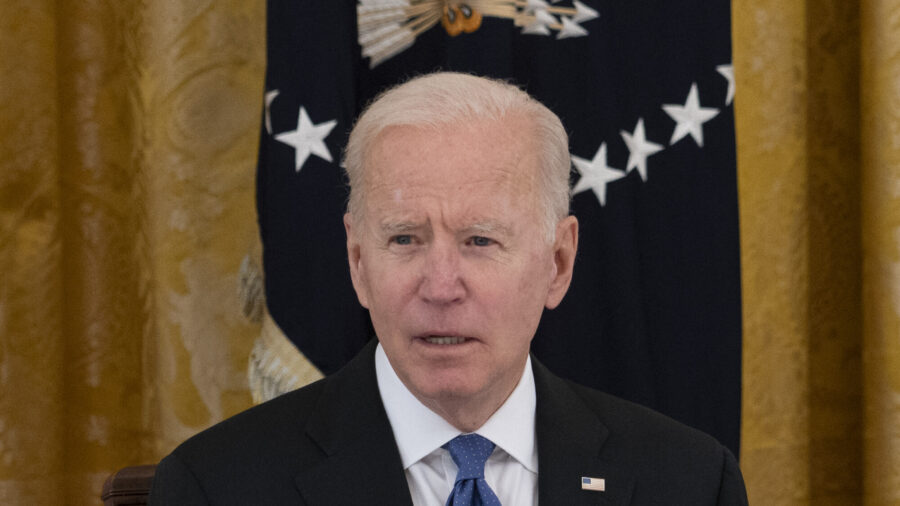Thirteen states launched legal action against the Biden administration over a provision in the CCP virus relief package that prohibits states from using the funds to pay for tax breaks.
The Democrats’ $1.9 trillion relief package to combat the impacts of the CCP (Chinese Communist Party) virus, the American Rescue Plan Act of 2021 (pdf), carries a provision that says states cannot use relief funds to offset decreased tax revenue that is due to any tax cuts—including by cutting rates, rebates, deductions, credits, or otherwise—and any tax delays.
The 13-state bipartisan coalition filed the federal lawsuit late Wednesday in the U.S. District Court for the Northern District of Alabama. They argued that the provision is unconstitutional.
The lawsuit (pdf) says the provision in the relief package is “one of the most egregious power grabs by the federal government in the nation’s history.” It argues that the provision, by stipulating how states use federal funds with regard to tax cuts, is akin to forcing states to relinquish control of their taxing authority, which is not allowed under the Tenth Amendment. The lawsuit also accuses the federal government of violating the conditional spending doctrine and the anti-commandeering doctrine.
Plaintiffs in the lawsuit are the states of West Virginia, Alabama, Alaska, Arkansas, Florida, Iowa, Kansas, Montana, New Hampshire, Oklahoma, South Carolina, South Dakota, and Utah. The defendants in the lawsuit are Treasury Secretary Janet Yellen and Treasury Department Inspector General Richard Delmar.
West Virginia Attorney General Patrick Morrisey, a Republican, leads the 13-state coalition.
“Never before has the federal government attempted such a complete takeover of state finances,” Morrisey said in a statement. “We cannot stand for such overreach. The Constitution envisions co-sovereign states, not a federal government that forces state legislatures to forfeit one of their core constitutional functions in exchange for a large check equal to approximately 25 percent of their annual respective general budgets.”

The specific provision of concern reads in full as follows: “A state or territory shall not use the funds provided under this section or transferred pursuant to this section to either directly or indirectly offset a reduction in the net tax revenue of such state of territory resulting from a change in law, regulation, or administrative interpretation during the covered period that reduces any tax (by providing for a reduction in a rate, a rebate, a deduction, a credit or otherwise) or delays the imposition of any tax or tax increase.”
Previously, attorneys general from 21 states wrote to Yellen on March 16 seeking clarity over the provision as written in the law and sought to confirm that the restriction would not strip states of their taxing authority. In their letter (pdf), they said that the legislation’s language that prohibits against offsetting reductions in state tax revenue is “unclear,” including with regard to how Treasury would interpret the word “indirectly” as contained in the provision.
They said the prohibition on “indirectly” offsetting tax breaks “could also be read to prohibit tax cuts or relief of any stripe, even if wholly unrelated to and independent of the availability of relief funds.”
“After all, money is fungible, and States must balance their budgets. So, in a sense, any tax relief enacted by a state legislature after the State has received relief funds could be viewed as “using” those funds as an “offset” that allows the State to provide that tax relief,” the 21 attorneys general wrote.
In her response on March 23, Yellen wrote, “The limitation affects States’ ability to retain only those federal funds used to offset a reduction in net tax revenue resulting from certain changes in state law.”

She added, “It is also important to note that States choosing to use the federal funds to offset a reduction in net tax revenue do not thereby forfeit their entire allocation of funds appropriated under this statute.”
“It is well established that Congress may place such reasonable conditions on how States may use federal funding,” she wrote.
“If States lower certain taxes but do not use funds under the Act to offset those cuts-for example, by replacing the lost revenue through other means-the limitation in the Act is not implicated,” Yellen also said.
But the Montana and West Virginia attorneys general’s offices pointed out in their statements that Yellen “failed to place limits on the vague provision.”
Morrisey’s office said that the issue “directly impacts” whether the law will infringe upon the state legislature’s consideration of a state proposal to eliminate income tax. He also took issue with how the Treasury would interpret the word “indirectly” in the provision.
“Our lawsuit is designed to protect West Virginia from federal overreach,” Morrisey said. “This ensures our citizens aren’t stuck with an unforeseen bill from the feds years from now.”
The latest lawsuit comes amid a slew of other actions taken by states against the Biden administration, claiming federal overreach.
Previously, 21 states sued the Biden administration on March 17 over President Joe Biden’s decisions to revoke the federal permit for the Keystone XL Pipeline. The administration was later sued by 14 states on March 24 over Biden’s executive action pausing new oil and gas drilling on federal land.
The Biden administration was also targeted for Biden’s climate change related executive order in a lawsuit on March 8 filed by 12 states saying that the move could severely affect their economies. A day later, the administration was sued by Arizona and Montana over immigration policies.
From The Epoch Times

